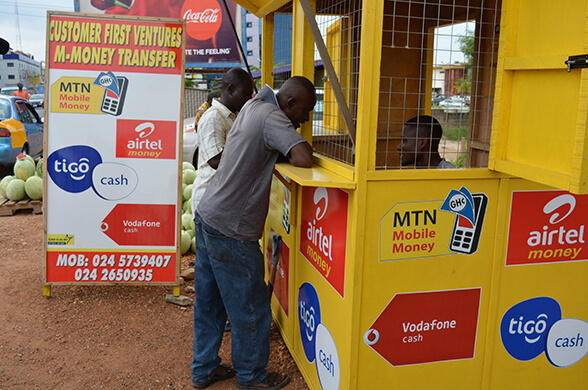The Institute of Statistics, Social, and Economic Research has indicated that the new restriction on mobile money (MOMO) transactions could derail the digitization of micro, small, and medium-sized enterprises and progress in the cash-lite economy.
In a press statement copied to the Ghana News Agency, the Institute acknowledged that the proposed rate would have a minimal impact on small-value transactions.
However, ISSER noted that the move would adversely impact micro, small, and medium enterprises that rely on MoMo for their financial transactions.
“Worthy of attention is the potential impact on micro and small enterprises, especially traders and farmers within the agricultural value chains concentrated in rural areas. For these segments, especially traders and transporters of foodstuffs who rely on MoMo to address security concerns with carrying cash across the country, an increase in cost is likely to be transferred to consumers,” the statement said.
This move, the institute said, could be a trigger for both food and non-food inflation.
The institute raised concern that beyond the move to restrict MoMo transactions, the developing social media-driven e-commerce ecosystem, which relies on MoMo for payment, would also see the transfer of the revised charges to consumers.
“As service providers on the various e-commerce platforms will pass on the charges to consumers in the form of increased prices of goods and services,” the statement said.
In a joint statement copied to the media, MOMO agents around Ghana said they would implement a temporary measure that limits cash withdrawals to GHS 1,000 per transaction from December 1.
ISSER said that the potential impact of the restrictions might be significant, particularly for neglected and last-mile populations.
“On average, 76 percent of mobile money agents are within 30 minutes of consumers in rural areas. On the other hand, it takes 2 hours for over 50 percent of rural dwellers to reach an ATM, with only about 40 percent being able to reach a bank or microfinance in two hours,” the statement said.
This situation ISSER said that many MoMo users in rural areas, where ATMs, banks, and microfinance institutions were not an option, would be confronted with the option of either enduring the high transaction costs or resorting to cash.
Latest Stories
-
Afenyo-Markin challenges Ahiafor’s sub judice ruling, calls it ‘dangerous precedent’
1 hour -
Mahama instructs Armed Forces to escort all vehicles in Bawku area
1 hour -
African artists, global awards, and the fight for visibility
1 hour -
This Saturday on Newsfile: GRNMA strike, ORAL probe into NSA, shut down of 64 radio stations
2 hours -
19 arrested in raid on drug and robbery dens at Kasoa Dominase, Onion Market
2 hours -
Luv FM High Schools Debate heats up as top schools advance to Round of 16
2 hours -
Asantehene urges chiefs to offer lands as equity for farming
3 hours -
GhanaFest Alberta 2025 launch ignites diaspora business momentum
3 hours -
22-year-old hearing-impaired man allegedly dies by suicide after rape accusation
3 hours -
CAETE 2025: MDF seals 10k jobs deal with China’s Yixintai Group
4 hours -
Climate Change: AGN Chair emphasises importance of Africa’s unity in global negotiations
4 hours -
TV stations risk prosecution over pirated content – Copyright Office warns
4 hours -
Anointed Engineering donates ‘Borla Macho III’ tricycle to support sanitation drive in Accra
4 hours -
CLOGSAG threatens strike in 2 weeks over delayed conditions of service
4 hours -
Resolve energy issues, don’t burden Ghanaians with new taxes – Tax Analyst
4 hours

